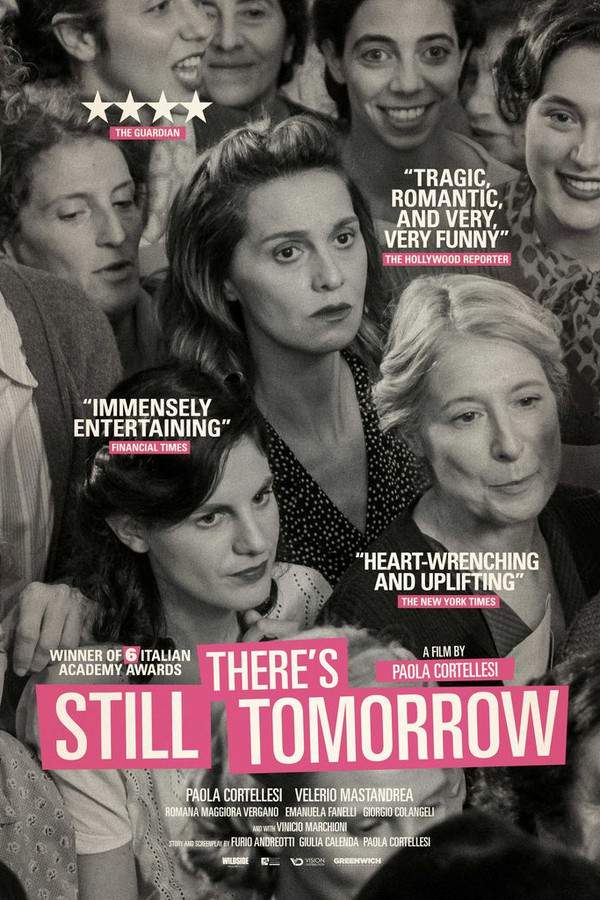There's Still Tomorrow 2025

Set in postwar Rome, a working-class woman struggles with an abusive husband while striving for a brighter future for her daughter. A surprising letter sparks a newfound courage within her, prompting her to confront her circumstances and seek a different path.
Does There's Still Tomorrow have end credit scenes?
No!
There's Still Tomorrow does not have end credit scenes. You can leave when the credits roll.
Meet the Full Cast and Actors of There's Still Tomorrow
Explore the complete cast of There's Still Tomorrow, including both lead and supporting actors. Learn who plays each character, discover their past roles and achievements, and find out what makes this ensemble cast stand out in the world of film and television.
External Links and Streaming Options
Discover where to watch There's Still Tomorrow online, including streaming platforms, rental options, and official sources. Compare reviews, ratings, and in-depth movie information across sites like Metacritic, Rotten Tomatoes, Wikipedia or Common Sense Media.
Ratings and Reviews for There's Still Tomorrow
See how There's Still Tomorrow is rated across major platforms like IMDb, Metacritic, and TMDb. Compare audience scores and critic reviews to understand where There's Still Tomorrow stands among top-rated movies in its genre.

59
Metascore
7.3
User Score


89%
TOMATOMETER

91%
User Score
Take the Ultimate There's Still Tomorrow Movie Quiz
Challenge your knowledge of There's Still Tomorrow with this fun and interactive movie quiz. Test yourself on key plot points, iconic characters, hidden details, and memorable moments to see how well you really know the film.
Exploring Delia's Journey: Test your knowledge about the film 'There's Still Tomorrow' and its themes of resilience and empowerment.
What year does the story of 'There's Still Tomorrow' take place?
Full Plot Summary and Ending Explained for There's Still Tomorrow
Read the complete plot summary of There's Still Tomorrow, including all major events, twists, and the full ending explained in detail. Explore key characters, themes, hidden meanings, and everything you need to understand the story from beginning to end.
In the aftermath of War, specifically in May 1946, the streets of Rome are filled with the sounds of Allied military troops driving around in Jeeps, while the city grapples with the challenges of poverty. This dismal landscape is underscored by the looming institutional referendum and the crucial election of the Constituent Assembly scheduled for June 2 and 3.
At the heart of this turmoil is Delia, a resilient woman caught in the harsh grip of her abusive husband Ivano (Valerio Mastandrea), and the devoted mother of three children, including her spirited teenage daughter, Marcella (Romana Maggiora Vergano). Amid her daily domestic obligations, Delia must also care for her bitter father-in-law, Ottorino (Giorgio Colangeli), while juggling various sewing and laundry tasks for affluent locals and city shops. Her friends play significant roles in her life, including Nino, a kind-hearted mechanic hopelessly in love with her, the optimistic market greengrocer Marisa, and William (Yonv Joseph), an African American soldier eager to assist her in breaking free from her oppressive circumstances.
Life takes a turn for Delia when Marcella announces her engagement to the charming but entitled Giulio Moretti, the heir to a family fortune built around a popular ice-cream parlor. Delia quickly realizes that this union could lead her daughter down the same painful path she herself endured, marked by violence and denigration. After a tense Sunday lunch with her future in-laws, where Giulio’s indoctrination of wealth and privilege becomes evident, Delia’s instincts kick in. Using the support of William, she resorts to drastic measures by blowing up Giulio’s bar, forcing his family to lose their fortune and vacate the area. Though Marcella is crushed by this turn of events, Delia feels a surge of empowerment, spurred on by the arrival of her first voter’s card in the mail—a potent symbol of her newfound agency.
Struggling with her domestic life, where her father-in-law’s unexpected passing brings a throng of relatives into her home, Delia remains determined to cast her vote in the upcoming election. However, in a twist of fate, she misplaces her voting card, which first falls into the hands of Ivano, then into the hands of Marcella, who chases after her mother to return it. This moment becomes pivotal, as driven by a fierce desire for change and personal liberation, Delia prepares to assert her presence at the polls—a first for many women in Italy, marking a monumental stride toward independence.
Delia, who had saved 8000 Lire from her meager earnings—initially meant for a wedding dress for Marcella—courageously redirects these funds towards financing her daughter’s education instead. Her journey illustrates a powerful narrative of resistance and hope in the face of adversity, ultimately blossoming into a tale of women’s empowerment as she strives to reclaim her identity and that of her children amid the political upheaval of the times.
Quick Links: Summary, Cast, Ratings, More

What's After the Movie?
Not sure whether to stay after the credits? Find out!
Explore Our Movie Platform
New Movie Releases (2025)
Famous Movie Actors
Top Film Production Studios
Movie Plot Summaries & Endings
Major Movie Awards & Winners
Best Concert Films & Music Documentaries
© 2025 What's After the Movie. All rights reserved.










